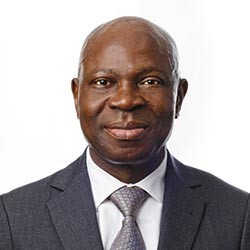Side event on trafficking in persons - Statement by Gilbert Houngbo, President of IFAD
IFAD Asset Request Portlet
Publicador de contenidos
Side event on trafficking in persons - Statement by Gilbert Houngbo, President of IFAD
23 junio 2022Check against delivery
Human trafficking is a violation of human rights. And it is a major obstacle to achieving the Sustainable Development Goals and a world free of poverty and hunger.
There are strong links between human trafficking and agriculture. In many parts of the world, agricultural work is typified by low pay, lack of protection, and a high risk of exploitation.
This is particularly stark in low income countries, where 60 per cent of the labour force works in agriculture.
The risks are highest for rural women and girls. This is a consequence of gender inequality, but also of disparities in land ownership and tenure.
Globally, women make up less than 20 per cent of the world’s landholders while – in areas such as South Asia and sub-Saharan Africa – they make up the majority of the agricultural workforce.
Overall, rural women are more likely to be involved in work that is dangerous, poorly paid and not covered by social protection. These inequalities lead to dependence, poverty and risks of violence -- including human trafficking.
Tragically, children are also affected by human trafficking. The prevalence of child labour in agriculture is unacceptable. And it is getting worse. Child labour is a breeding ground for the trafficking of children into forced labour, prostitution, and exploitation.
More than 100 million girls and boys work in agriculture globally. This is three quarters of all child labour. And the total number has increased by more than 8 million in the past four years.
Ladies and Gentlemen,
Human trafficking is a gross violation of human rights that must be eliminated. So, what can we do to make sure this happens?
First, we must deliver on the right of decent work and living incomes for all people, including men, women and youth working in food systems.
This means investing in small-scale farmers so they can be more productive, and ensure they have access markets on fair terms. When small scale farming is profitable, farmers invest in their farms and increase their spending on local goods -- this creates employment and raises incomes in rural communities.
When development starts from the grassroots up, it benefits the poorest and most vulnerable. This reduces their exposure to the exploitative conditions, coercion and abuse that are associated with human trafficking.
Second, we need more investment in labour-saving technologies and infrastructure in rural areas. These reduce the demand for child labour. When women have access to labour-saving technologies, they have more time in their day to earn money and look after their families.
Third, we need to make rural areas attractive to young people, with more opportunities for employment, and also recreation and social activities. When young people have decent employment and are busy and happy, they are less likely to gravitate towards coercive forms of work, especially those that lead to human trafficking.
They need options, not only in small-scale farming but in areas where they can be entrepreneurs, such as food processing, storage, and marketing. And we must ensure that young women have the same opportunities as young men.
A future without human trafficking and child labour is possible. And we must turn this positilby into a reality.
